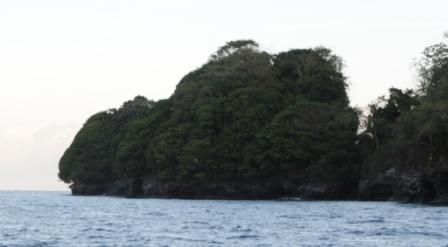We can now be found at www.ccaro.org! >> Explore CCARO's website today _________________________________________________________________________________________ On the 24th January, I found myself on a Coast Guard vessel at 6:30am Saut d'Eau (So-do) with camera and binoculars in hand, looking for any signs of whales or dolphins. I was on CCARO's first cetacean survey of the year. The opportunity for the survey came about when we heard that the Caribbean Forest Conservation Association (CFCA), working with EMA, the Wildlife/Forestry Division and UWI, was embarking on a 6 month survey of the sea bird populations on two offshore islands, Saut d'Eau and Soldado Rock, which are important breeding sites for many of our seabirds. When CCARO approached them about the possibility of having a CCARO researcher accompanying them on their bird surveys, to do separate whale and dolphin surveys, they generously agreed. This month we went on a trial survey of the area, and from February we expect to be doing two boat-based surveys every month (one to Soldado Rock and one to Saut d'Eau) until July. On this month's survey, although we have heard from our interviews with fishermen that dolphins pass along this north coast route regularly in the morning, no whales or dolphins were spotted along our survey route. This may be due to the sea conditions at the time which were not terribly rough (beauford 3 and low to medium swell) but just bad enough to reduce visibility of any surfacing animals or it is possib  le that they only use this area at certain times of day or year. That is just the kind of information we hope to find out: who uses this area and when. We look forward to the surveys of the next 6 months and we will keep you informed of our findings. le that they only use this area at certain times of day or year. That is just the kind of information we hope to find out: who uses this area and when. We look forward to the surveys of the next 6 months and we will keep you informed of our findings. A partial view of Saut d'Eau Island _________________________________________________________________________________________ Project Updates Project 1: Public Knowledge Assessment 1 Our Public Knowledge Assessment questionnaires are still being administered by willing volunteers accross the country, but we still have some way to go. The preliminary results show that the public has a familiarity with and interest in cetaceans and their welfare but a lack of awareness of local cetaceans or the ways that we, as a country, can affect them. We are happy to see such a positive public attitude toward these animals in the areas we have assessed so far and aim to raise awarness and knowledge of local whales and dolphins in our future educational programmes.If you are interested in helping to administer questionnaires please check our project page to see the areas in which we need help. Perhaps you can do some around your home or place of work. Project 2: Creation of Cetacean Species Fact Sheets On the 25th January 2010 we began a project to create fact sheets for every species of whale and dolphin that may be found in the waters of Trinidad and Tobago. When completed, these fact sheets will be uploaded to our website (www.caro.org) to provide the public with basic information on any cetacean that they are likely to encounter in local waters. To determine which species probably use our waters, we looked at the global range (geographical area a species uses) of every whale or dolphin species to see if it included Trinidad and Tobago. There were 28 species whoes ranges include Trinidad and Tobago. While this does not mean that there are definately 28 species living in our waters, it is highly likely that they may occationally use local waters or that they use the waters of nearby countries such as Venezuela, Grenada or Barbados. To get a real idea of what cetaceans are definately found locally we need to continue to collect information on sightings of whales and dolphins. So keep sending in information, pictures and videos of any whales and dolphins that you see locally to CCARO through our website by clicking Report Stranding (for whales or dolphins that were stranded on the beach) and Report Sighting (for whales or dolphins in the water) or Contact Us by phone or email, as each piece of information helps to improve our knowledge of these amazing animals. If you want to volunteer for this project feel free to contact us. For more information, check out our project page. | Volunteer Opportunities Administering questionnaires Filling out electronic species fact sheets with relevant information. Upcoming Activity Nature Seekers' Beach Clean Up Join us on this February 28th as we help clean up Orosco Bay for the turtle nesting season. _____________________________ Donations Welcome! If you would like to donate any of the items on our wish list please contact us to make arrangements. Our Wish List Printed Contact Information Cards Boat driving lessons (beginner) 2.5" Parallel ATA (IDE) hard drive MP3 recorder with a 1/4" or 1/8" microphone input Contact: cetaean.conservation.tt@gmail.com ____________________________________ Thank You! Thanks to all of you who volunteered to help with our projects in January 2010. Thanks to Alan Rajkumar Maharaj for vectorizing our CCARO logo. Thanks for the donation which allowed us to purchase our new website address, www.ccaro.org. Thanks to CFCA for allowing a CCARO researcher to conduct cetacean surveys from their research vessel. |